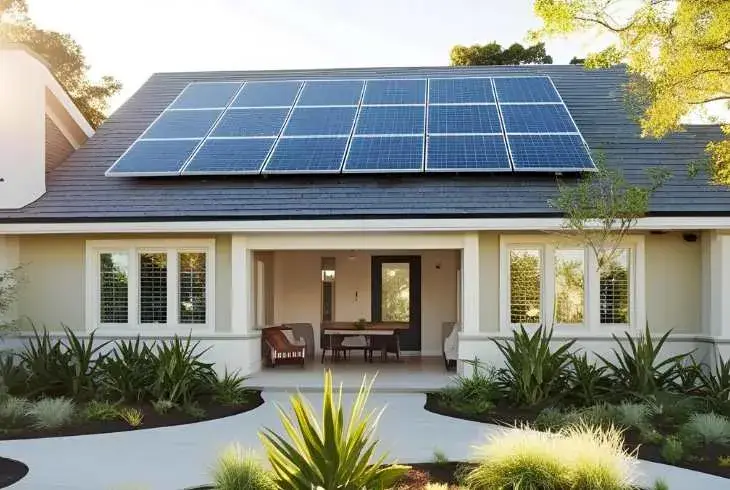Sustainable Energy 2025: Top Benefits, Solutions & Tips
Last Updated: Mar 29, 2025

Did you know that over 80% of the world's energy still comes from fossil fuels? That's a big problem for our planet, but also a big opportunity. Sustainable energy is more than just a buzzword. It's the path forward, and it's gaining serious momentum nowadays.
From solar panels on rooftops to wind farms powering entire regions, sustainable energy solutions are driving change at every level. Whether you're a homeowner, business owner, or someone who simply wants to live greener, this guide will help you understand what sustainable energy is, why it matters, and how to start making the switch today.
What Is Sustainable Energy?

Sustainable energy refers to energy sources and systems that meet today's power needs without compromising future generations. It's not just renewable. It's environmentally sound, economically viable, and socially responsible.
While renewable energy (like solar and wind) often fits the sustainable definition, sustainability also includes how those resources are sourced, managed, and implemented.
Sustainable energy is all about:
- Reducing carbon emissions and pollutants
- Preserving natural resources
- Providing long-term energy access
- Promoting energy equity and resilience
In a world facing climate change and resource depletion, sustainable energy is our best bet for a cleaner, fairer future.
Key Types of Sustainable Energy Sources

Solar Energy
Harnesses sunlight through photovoltaic panels or solar thermal systems. It's silent, scalable, and perfect for homes and businesses.
Wind Energy
Onshore and offshore turbines capture kinetic energy from the wind to generate clean electricity, often at a large scale.
Hydropower
Uses flowing or falling water. Typically through dams or micro hydro systems to produce steady, renewable power.
Geothermal Energy
Taps the Earth's internal heat to generate electricity or provide direct heating. It's incredibly stable and efficient.
Bioenergy
Converts organic waste, wood, or algae into electricity, heat, or fuel (biofuels and biogas), offering a sustainable way to manage waste and produce energy.
The Benefits of Switching to Sustainable Energy

- Cuts Carbon Emissions: Reduces the impact on climate change.
- Cleaner Air and Water: Fewer pollutants mean healthier communities.
- Lower Bills: After installation, clean energy systems often lower monthly energy costs.
- Job Growth: Green energy jobs are booming—from engineers to technicians.
- Energy Independence: Producing local power reduces dependence on imported fossil fuels.
Sustainable energy doesn't just benefit the environment, it benefits your wallet and health too.
Barriers to Sustainable Energy Adoption
- Upfront Costs: Solar panels, wind turbines, and energy storage still require initial investment.
- Infrastructure Limits: Outdated grids can't always handle renewable surges.
- Policy Gaps: Inconsistent regulations or lack of incentives can slow adoption.
- Storage Issues: Solar and wind depend on weather battery storage is key.
- Public Awareness: Misinformation or lack of knowledge can prevent action.
The good news? These are solvable problems, and progress is accelerating.
Innovations Driving the Future of Sustainable Energy

- Smart Grids: Use real-time data and AI to balance demand and supply.
- Advanced Batteries: From solid state to flow batteries, new tech extends storage capacity.
- Floating Solar Panels: Ideal for areas with limited land.
- Green Hydrogen: Produced with renewable electricity and usable in industry and transportation.
- Energy Efficient Buildings: Think solar windows, AI controlled HVAC, and smart thermostats.
The future of energy isn't just sustainable, it's intelligent.
How to Make the Switch to Sustainable Energy

- Audit Your Usage: Use smart meters to track your energy habits.
- Install Renewable Tech: Solar panels, solar water heaters, or wind turbines, depending on your location.
- Pick Green Energy Plans: Many utility providers offer 100% clean energy options.
- Upgrade to Efficient Appliances: LED bulbs, Energy Star appliances, and smart systems save energy daily.
- Take Advantage of Incentives: Tax credits, rebates, and grants can offset upfront costs.
You don't have to do everything at once. Start small, and grow your impact over time.
Sustainable Energy and Everyday Life

- Electric Vehicles (EVs): Quiet, clean, and increasingly affordable.
- Smart Homes: Smart thermostats, solar panels, and efficient lighting all add up.
- Public Transit: Cleaner buses, trains, and bike. Sharing programs reduce urban emissions.
- Community Solar: Shared solar projects make clean energy accessible to renters and neighborhoods.
- Conscious Choices: Unplug devices, cut waste, and support sustainable brands.
Living green is no longer difficult. It's just a series of small, smart choices.
In Summary
Sustainable energy is here, and it's the smartest way to power our world. From reducing emissions to saving money and creating jobs, the benefits are clear and compelling.
Nowadyas, we're seeing more opportunities than ever to take part in the energy transition. Whether you're installing rooftop solar, driving an electric car, or choosing a green energy provider, every action matters.
So, what's your next move? Start today. Go green. And help power a better, cleaner future for all of us.





